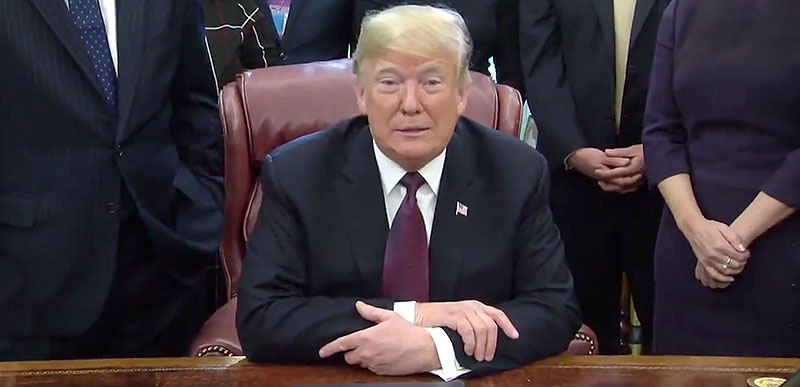There’s an article in today’s USA Today that explains how Trump can pay for the wall without approval from Congress, using executive funds from other departments:
A week ago, the White House put out a call to federal agencies to look for “pots of money” in their existing budgets that could be cobbled together to pay for border wall construction. Immediately, Sen. John Thune, the Republican whip in the upper chamber, shot down the idea of shifting funds from executive departments to the border, saying, “I’m not a big fan of moving money.” Like it or not, there are sources of revenue in the executive branch that the president has authority to use without congressional approval.
The Department of Agriculture has about $200 billion in outstanding loans for rural development projects such as community buildings, bridges, roads, fire stations, police stations, water projects and barriers such as fencing and walls. These federal loans to local communities have low default rates that are attractive to private-sector investors because they represent large, reliable cash flows — the kind of investments that big money funds desperately desire.
About $50-100 billion worth currently held by USDA are very marketable and attractive commercial paper investments. The rights to collect the remainder of the debt on these loans could be sold to private parties who would pay a premium for such a steady stream of cash payments. The sales would give a profit cushion to the government and alleviate taxpayers from any future risk of nonpayment while retaining certain borrower guarantees.
For example, Trump could authorize the sale of $10 billion of USDA rural water loans on the secondary market, which could bring in a lump sum payment of $12 billion or more. Revenue from these proceeds could be directed to build the border wall.
Legal authority comes from many angles. Obama stimulus loans (approximately $2-$5 billion) could be separated out and used because they involved “no year” money, meaning the funds don’t expire if not spent in a certain time frame. The president could tap into USDA’s Community Facilities Programs money if recouped funds from the sale were used for new loans to cooperating communities on the border, such as in Texas.
Another option would be to utilize funds in the same way USDA undertakes in-kind swaps with private parties to the tune of hundreds of millions of dollars worth of commodities and services. This would entail swapping the proceeds of the commercial paper sales for the wall, with construction companies being the counterparties.
These are only a few creative funding avenues that could be explored, some less complicated than others. Such an aggressive approach is a sure way for Trump to regain the initiative and get the attention of lawmakers who have an interest in killing any threat to their control over spending, thus giving the president leverage in negotiations as pressure mounts to end the shutdown.
The precedent has already been set by previous presidents:
While the Constitution gives Congress power over the government’s purse strings, presidents of both parties have pushed the limits of their flexibility to use executive-branch funds free of congressional micromanagement. President George W. Bush was criticized for keeping billions in war spending off the books so it could be diverted to secret operations free from congressional oversight. Conservatives complained that President Barack Obama spent billions on health care without congressional authorization.
I’m not a fan of going around Congress for anything, but past congresses have approved the building of a wall. And the wall is an issue of national security, to control who is coming across our southern border.
So if Trump can legally secure the funding to build it, then I’m all for it. We all know we need a wall. And we all know party politics is the only reason we don’t have it yet.
Here’s what I think will happen. Assuming Congress doesn’t flinch, Trump will exhaust the government shutdown and finally give in to limited border wall funding. He’ll say Congress has left him no choice but to pay for it using other funds and, because it’s an issue of national security, he’ll get the military to build the wall.

